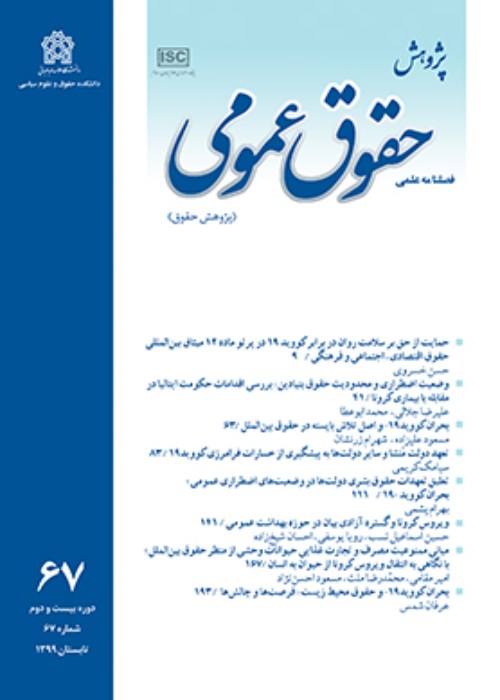Ensuring Access to Courts for Seafarers: Examining Iran's Admiralty Court
Author(s):
Article Type:
Research/Original Article (دارای رتبه معتبر)
Abstract:
Seafaring is one of the risky jobs that needs more support and attention from governments and the international community. Human rights apply at sea as they do on land. Since the abuse of human rights at sea is not as tangible as it is on land, it has not received much attention from the international community. However, due to the importance of the role of shipping in international trade and, consequently, the role of seafarers in this industry, this group should be given more attention. Accordingly, international organizations and non-governmental organizations (NGOs) such as ILO (International Labor Organization) pave the way for protecting seafarers' rights by developing international documents.The most important international document by the ILO is the Maritime Labor Convention. The Maritime Labor Convention (2006) is often described as the "Seafarers' Labor Rights Charter". This convention places responsibility on the flag state and the port state as well as the labor supply state.The unfavorable working conditions of seafarers, due to the temporary nature of their work and the lack of effective implementation of domestic and international laws by the flag state, put seafarers in a bad situation. Seafarers' rights depend on where the ship is registered. Examining the policies of the governments that grant convenience flags and paying attention to the cases in which even the seafarers’ basic rights are ignored, it is evident that joining international documents on behalf of these governments is a tool for them to present a positive image in the international community.On one hand, lack of implementation of a monitoring mechanism on seafarers' rights and international agreements and documents leads to the violation of international obligations. On the other hand, the seizure of ships by the coastal states for various reasons and detention of the crews, in a country whose laws are not familiar, may further result in the violation of seafarers' rights. Whereas the expansion of the use of convenience flags places more prominence on the role of the coastal government to enforce the rights of seafarers.The coastal government plays an important role in observing the rights of seafarers based on the Convention on the Law of the Sea, the Maritime Labor Convention, and the Tokyo and Paris Memorandum. In addition, for the effective implementation of seafarers' rights, there are international organizations such as FAO, IMO, and ILO that aid in this path, in addition to better and more cooperation with non-governmental organizations such as the "Human Rights at Sea".Obviously, rights have a limited value if it is not implemented in practice. So how can seafarers guarantee the implementation of their rights? Or in case of violation, how is it possible to compensate? As said before, the rights of seafarers are described in international conventions and treaties, the ILO conventions allow seafarers to learn about their rights and encourage the government to implement laws and regulations to protect them, but the mentioned documents lack a guarantee to oblige governments to implement them and so, there is no monitoring and reporting mechanism for human rights violations at sea. The monitoring mechanism should be available for the crew to sue the violation of their human rights.It seems that the establishment of competent maritime courts and the possibility of access to these courts can guarantee the observance of seafarers' rights. Although the establishment of competent courts is an important step in promoting respect for human rights, the establishment of competent courts will not be effective without experts who are familiar with the rules of international law and the law of the seas. There is hope that the establishment of the Maritime Court along with the approval of the "Commercial Shipping Law" will improve the respect and enforcement of seafarers' rights in Iran. It is better for the judges and experts of this specialized court to be familiar with the principles and rules of international law of the seas and other branches related to international law, including human rights. In other words, the establishment of courts with exclusive jurisdiction and the presence of judges and legal experts with sufficient knowledge in the field of international law of the seas and familiarity with the principles and rules of international law can have a significant impact on protecting the rights of seafarers. In this paper, we use the descriptive-analytical method and library resources as well as electronic resources such as books, articles, theses, and official conferences related to the subject (regional and international) in Persian and English languages.
Keywords:
Language:
Persian
Published:
Journal of Public Law Research, Volume:24 Issue: 78, 2023
Pages:
83 to 118
magiran.com/p2584626
دانلود و مطالعه متن این مقاله با یکی از روشهای زیر امکان پذیر است:
اشتراک شخصی
با عضویت و پرداخت آنلاین حق اشتراک یکساله به مبلغ 1,390,000ريال میتوانید 70 عنوان مطلب دانلود کنید!
اشتراک سازمانی
به کتابخانه دانشگاه یا محل کار خود پیشنهاد کنید تا اشتراک سازمانی این پایگاه را برای دسترسی نامحدود همه کاربران به متن مطالب تهیه نمایند!
توجه!
- حق عضویت دریافتی صرف حمایت از نشریات عضو و نگهداری، تکمیل و توسعه مگیران میشود.
- پرداخت حق اشتراک و دانلود مقالات اجازه بازنشر آن در سایر رسانههای چاپی و دیجیتال را به کاربر نمیدهد.
In order to view content subscription is required
Personal subscription
Subscribe magiran.com for 70 € euros via PayPal and download 70 articles during a year.
Organization subscription
Please contact us to subscribe your university or library for unlimited access!



